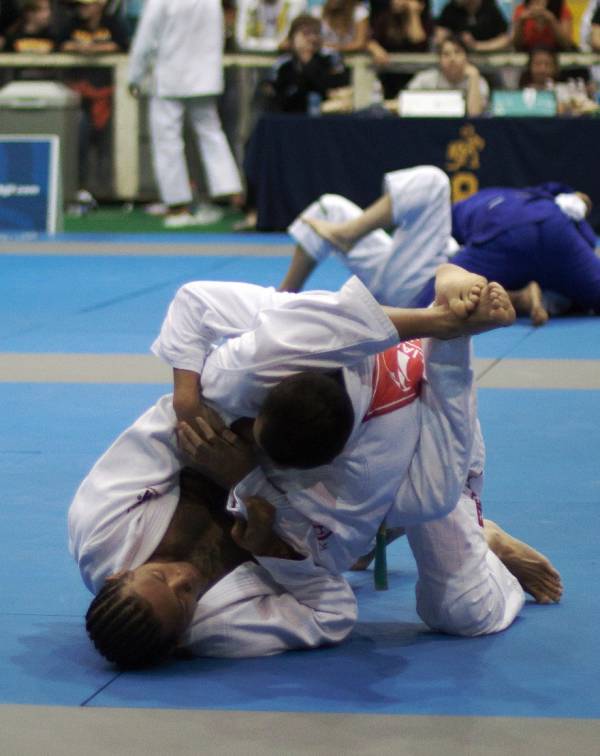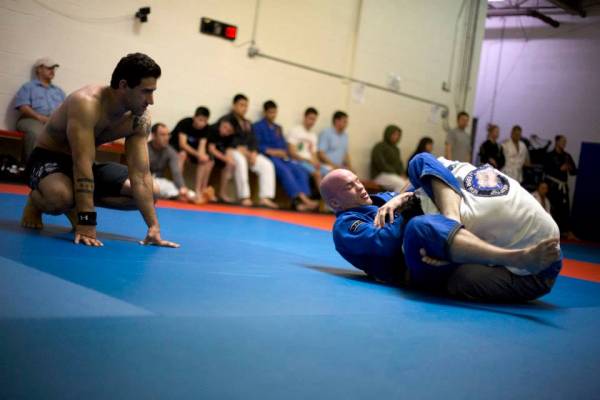When preparing for a competition the hardest thing for most people is not the actual training, but the diet and the cutting of weight. How do you cut weight and work full time? Better yet, how do you cut weight and still have a normal life? It is hard enough to manage training, work, school, and family.
The goal for this article is to provide you with some tips on safe weight cutting – not just for the full-time competitor but for the competitor who has to deal with work, family, or school. Many competitors unknowingly cut weight the wrong way, and even worse they cut weight in a way that is dangerous. No matter who you are, your health is your number one priority.
Making Weight in the Real World
Depending on the event, weigh-ins can be the same day or the day before the competition. The “water trick,” as it is commonly referred to, is a great method for cutting weight when day-before weigh-ins are allowed. However, the first phase of this requires consuming two to three gallons of water per day and some people find that difficult while at work. In addition, the final day before competition requires restricting water and food and that also does not play out well when you have to work all day. When fluid and food are restricted mood tends to be negatively affected.
So, for someone who has to deal with work and family I suggest the same strategy for both types of weigh-in. The solution is to plan out your competitions in advance. Instead of doing a dramatic weight cut, you are better off bringing your weight down slowly over eight to twelve weeks. For competitions that pop up last minute, compete at your current weight. If you decided a week before a competition to compete, then just compete at your walking around weight. There is no need to put your body under any additional stress.
Bringing Weight Down Slowly
Nutrition is complicated. I could spend months writing about this topic alone. Instead, I will focus on some common mistakes I see when competitors cut weight.
Mistake #1: Caloric Restriction
 First, severe calorie restriction. When you compete you want to perform your best. When calories are kept too low, then performance goes down. Other people choose to keep calories normal, but they train like crazy. This is no good either. There needs to be a balance. Your goal is to eat enough that performance does not suffer and your weight is going down. The sweet spot is different for everyone. To ensure you are on the right track, pay attention to your performance. Is your performance suffering? I know this is subjective, but it’s key in determining how much or how little to eat. Then use the scale. Is your performance good? Is the scale going down? If so, you found your sweet spot. Keep it there. This may take some playing around with.
First, severe calorie restriction. When you compete you want to perform your best. When calories are kept too low, then performance goes down. Other people choose to keep calories normal, but they train like crazy. This is no good either. There needs to be a balance. Your goal is to eat enough that performance does not suffer and your weight is going down. The sweet spot is different for everyone. To ensure you are on the right track, pay attention to your performance. Is your performance suffering? I know this is subjective, but it’s key in determining how much or how little to eat. Then use the scale. Is your performance good? Is the scale going down? If so, you found your sweet spot. Keep it there. This may take some playing around with.
Mistake #2: Macronutrient Restriction
Second, competitors try to make weight by eliminating a macronutrient group. Protein, carbohydrates, and fats are important for health and performance. Every macronutrient serves a purpose. Proteins help to rebuild and repair muscle tissue. Carbohydrates replenish glycogen. Fats are needed for hormones and cell membranes. Instead of eliminating a group, you should change the timing.
Proteins and fats should be consumed up until training time. After training, carbohydrates can be consumed. Consuming carbohydrates post-workout spikes insulin. The spike in insulin drops cortisol. A drop in cortisol after training is a good thing and it can help you sleep. Immediately after your training session consume a liquid meal of whey protein. For an added bonus, add in some leucine and creatine. When you get home eat some protein and carbs with your family or friends. This way you will not be relegated to sitting at the table with them, but eating salad and chicken. There is nothing worse when you are cutting weight than sitting around with your friends or family watching them eat. Worse yet is having to explain to others why you are not eating the potatoes and just having a salad.
Some competitors choose to eliminate fat. At first this may seem like a good idea since fat is nine calories per gram. Fat is more calorie dense than protein and carbohydrates. The problem is fat is critical to your health and performance. I am not talking about eliminating bad fats. Everyone should do that. It’s the elimination of all fats that is the problem. Every type of fat has its place. Saturated fat is important for hormone production and omega-3s are important for cell health and reducing inflammation. There is a time and a place for every macronutrient. Fat is no different. Coconut oil, for example, provides the bodies with medium chain triglycerides (MCTs). MCTs are available almost instantly for your body to use as energy. During periods of carbohydrate restriction increasing your intake of coconut oil will improve your energy. Since you will not be eating a lot of carbohydrates during the day, add some coconut oil to a few of your meals leading up to your training session.
The Advantages of Starting Early
 When you start your weight cut early you have some advantages over the competitor who waited until the last minute. If your weight cut is planned out in advance, you will hit your goal weight the week before your tournament. This gives your body time to get used to your new weight. Believe it or not, a few extra pounds here and there is going affect the timing of your movements. Second, by bringing down your weight slowly there is no need to dehydrate or restrict food. In the later rounds of a competition, dehydration and food restriction can have a major impact on performance. Dehydration by as little as 2% will have an impact, and fluid loss greater than 5% of body mass results in a 30% reduction in performance.1
When you start your weight cut early you have some advantages over the competitor who waited until the last minute. If your weight cut is planned out in advance, you will hit your goal weight the week before your tournament. This gives your body time to get used to your new weight. Believe it or not, a few extra pounds here and there is going affect the timing of your movements. Second, by bringing down your weight slowly there is no need to dehydrate or restrict food. In the later rounds of a competition, dehydration and food restriction can have a major impact on performance. Dehydration by as little as 2% will have an impact, and fluid loss greater than 5% of body mass results in a 30% reduction in performance.1
Part of competition is mental. For me, knowing I have put in the time to make weight properly gives me a mental edge. There is nothing better than meeting an opponent in the later rounds of a tournament who is dehydrated and hungry. If I did my job right I will be able to push a pace that is going to be hard to deal with for someone who is dehydrated.
Closing Thoughts
Competing in Brazilian jiu jitsu is an amazing experience. It teaches you a lot about yourself and weaknesses in your game. For some it can be a source of stress. Constantly thinking about what you are eating and drinking takes a mental toll on anyone. By planning your tournament season early you can bring your weight down slowly, allowing you to avoid the moodiness and stress that can come from calorie and fluid restriction.
Your number one goal at a competition is performance. When calories are low and fluid is restricted, performance will suffer. There is nothing worse than losing a match because you were tired. Losing a match because someone is better than you at Brazilian jiu jitsu is going to happen. Losing a match because you are too drained from your weight cut should not.
References:
1. Asker Jeukendrup and Michael Gleeson, Sport Nutrition-2nd Edition, (Human Kinetics, 2010).
Photos by Ana Nieves.






